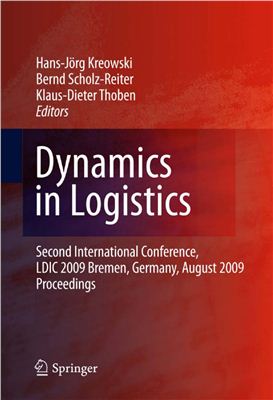Springer- Verlag, 2011. 500 p. ISBN: 3642119956 (на английском
языке)
The volume comprises the proceedings of the second Inteational Conference on Dynamics in Logistics LDIC 2009. The scope of the conference was conceed with the identification, analysis, and description of the dynamics of logistic processes and networks. The spectrum reached from the planning and modelling of processes over innovative methods like autonomous control and knowledge management to the new technologies provided by radio frequency identification, mobile communication, and networking. The growing dynamics confronts the area of logistics with completely new challenges: It must become possible to rapidly and flexibly adapt logistic processes and networks to continuously changing conditions. LDIC 2009 provided a forum for the discussion of advances in that matter. The volume consists of one invited paper and of 47 contributed papers divided into various subjects including mathematical modelling in transport and production logistics, routing in dynamic logistic networks, sustainable collaboration and supply chain control policies, information, communication, autonomy, adaption and cognition in logistics, radio frequency identification in logistics and manufacturing networks, applications in production logistics, and logistic solutions for ports, container terminals, regions and services.
The volume comprises the proceedings of the second Inteational Conference on Dynamics in Logistics LDIC 2009. The scope of the conference was conceed with the identification, analysis, and description of the dynamics of logistic processes and networks. The spectrum reached from the planning and modelling of processes over innovative methods like autonomous control and knowledge management to the new technologies provided by radio frequency identification, mobile communication, and networking. The growing dynamics confronts the area of logistics with completely new challenges: It must become possible to rapidly and flexibly adapt logistic processes and networks to continuously changing conditions. LDIC 2009 provided a forum for the discussion of advances in that matter. The volume consists of one invited paper and of 47 contributed papers divided into various subjects including mathematical modelling in transport and production logistics, routing in dynamic logistic networks, sustainable collaboration and supply chain control policies, information, communication, autonomy, adaption and cognition in logistics, radio frequency identification in logistics and manufacturing networks, applications in production logistics, and logistic solutions for ports, container terminals, regions and services.

